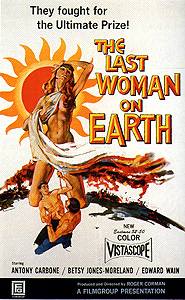 The Last Woman on Earth (1960) *
The Last Woman on Earth (1960) *
Some ideas are so self-evidently bad that you really have to marvel that anyone would actually bother to follow through on them. Somewhere not too far from the center of this category is the notion of making a movie about the end of the world on a budget so small that the tax break a producer used to be able to get for shooting in Puerto Rico becomes an economically compelling incentive. Also somewhere in that vast tract of territory is the idea of giving a just-starting-out screenwriter the extremely demanding job of writing a philosophical, character-driven script for a cast of only three people, most of which is confined to two rooms of a house and a deserted stretch of shoreline. Roger Corman was not daunted by such considerations, however, and thus it was that the world would have to contend with The Last Woman on Earth, the trash-movie overlord’s misguided attempt to do The World, the Flesh, and the Devil with three actors, an empty house, and a handful of loose change.
Shady and arrogant businessman Harold Gern (Antony Carbone, from A Bucket of Blood and The Pit and the Pendulum) is on vacation in Puerto Rico with his wife, Evelyn (Betsy Jones-Moreland, of Creature from the Haunted Sea and The Saga of the Viking Women and Their Voyage to the Waters of the Great Sea Serpent). Evelyn is not having a good time. For one thing, her husband’s idea of a romantic evening out is to take her to see a cockfight before moving on to the craps table at the casino on the first floor of their hotel. For another— and this irks Evelyn even more— Harold seems incapable of disengaging his mind from his work for more than a few minutes at a stretch. Thus when the Gerns are accosted at the cockfighting arena by Harold’s lawyer, Martin Joyce (screenwriter Robert Towne), Harold abandons his wife completely to talk with Martin over the latest indictment pending against him back home. Truth be told, Martin isn’t terribly happy with Harold, either, for despite his nearly monomaniacal dedication to his business, he can’t seem to be bothered to pay attention to whether or not his latest scheme for furthering it is in fact legal. Through an odd chain of events, Martin and Evelyn wind up consoling each other up in the hotel room while Harold pursues his oscillating fortunes in the casino, and Martin gets brought along for the ride the next morning when the Gerns head out on their yacht for a bit of scuba diving.
As it happens, that frivolous little excursion means that Harold, Evelyn, and Martin are among the very, very few who survive the end of the world. While the three of them are down below, locked in mortal combat with the fearsome cow-nosed ray of the Caribbean (I guess there was no money in the budget for stock footage of a barracuda or a moray eel…), some unexplained bad business causes all the free oxygen in the lower atmosphere to disappear for a bit less than an hour. Cost-effective? Yes. Cinematic? Hardly. Our heroes get wise to the trouble when they climb back aboard the boat and start feeling faint the moment they spit out the mouthpieces of their air tanks. Returning to Puerto Rico (with breathing tubes firmly back in place), they find the island devoid of all human and animal life. (For that matter, there are precious few corpses in evidence— I counted two— despite Martin’s alarmed pronouncement that the stench of decay will render the town where they had been staying uninhabitable within a day or two at most.) Nor is there anything coming in over the radio to suggest that the mysterious catastrophe is confined to Puerto Rico. So far as Harold, Evelyn, and Martin can see, there’s a strong possibility that they may be the last three humans alive on Earth.
Let’s take a moment now to assess this situation in some detail. First of all, we’ve got two men among our survivors of the apocalypse, but only one woman. Second, one of those men is married to the woman, but we’ve seen reason to believe that she would honestly prefer to be with the other one at this point. Finally, the two men have also established that their philosophies of life are more or less mutually antithetical. What do you suppose all this might mean for the remainder of the film? Why, yes— one virtually non-stop three-way argument consuming nearly the whole of the remaining running time. How perceptive of you! Nothing ever gets resolved, really, even after one of the three survivors is killed at the end of a climax that seems to have been written mostly so as to take advantage of a location which Corman didn’t discover until the final days of the shoot. The endless bickering and circular philosophizing lead absolutely nowhere, the two bursts of action devolve into chase sequences that attempt to substitute scenic interest for dramatic urgency, and in general, The Last Woman on Earth enjoys the distinction of being among its creator’s most pointless and uninteresting movies. If you’re left with the impression that Corman probably made this turkey solely as an excuse to take a two-week vacation in Puerto Rico, you’re not alone.
Home Alphabetical Index Chronological Index Contact
